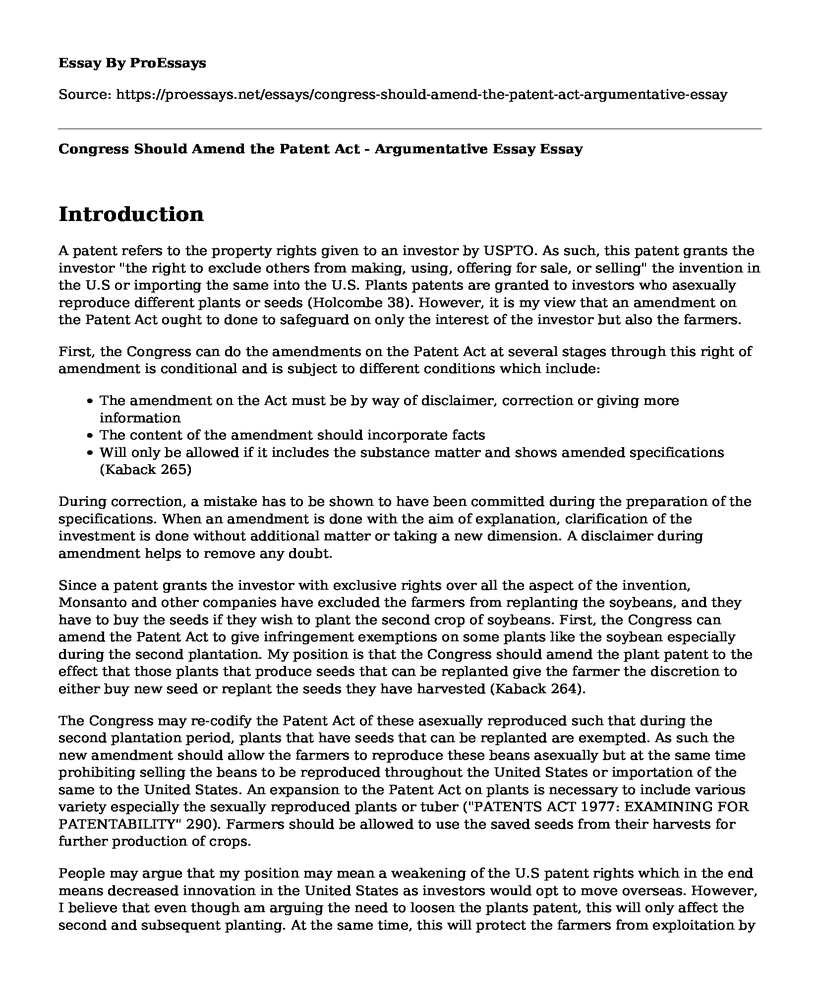Introduction
A patent refers to the property rights given to an investor by USPTO. As such, this patent grants the investor "the right to exclude others from making, using, offering for sale, or selling" the invention in the U.S or importing the same into the U.S. Plants patents are granted to investors who asexually reproduce different plants or seeds (Holcombe 38). However, it is my view that an amendment on the Patent Act ought to done to safeguard on only the interest of the investor but also the farmers.
First, the Congress can do the amendments on the Patent Act at several stages through this right of amendment is conditional and is subject to different conditions which include:
- The amendment on the Act must be by way of disclaimer, correction or giving more information
- The content of the amendment should incorporate facts
- Will only be allowed if it includes the substance matter and shows amended specifications (Kaback 265)
During correction, a mistake has to be shown to have been committed during the preparation of the specifications. When an amendment is done with the aim of explanation, clarification of the investment is done without additional matter or taking a new dimension. A disclaimer during amendment helps to remove any doubt.
Since a patent grants the investor with exclusive rights over all the aspect of the invention, Monsanto and other companies have excluded the farmers from replanting the soybeans, and they have to buy the seeds if they wish to plant the second crop of soybeans. First, the Congress can amend the Patent Act to give infringement exemptions on some plants like the soybean especially during the second plantation. My position is that the Congress should amend the plant patent to the effect that those plants that produce seeds that can be replanted give the farmer the discretion to either buy new seed or replant the seeds they have harvested (Kaback 264).
The Congress may re-codify the Patent Act of these asexually reproduced such that during the second plantation period, plants that have seeds that can be replanted are exempted. As such the new amendment should allow the farmers to reproduce these beans asexually but at the same time prohibiting selling the beans to be reproduced throughout the United States or importation of the same to the United States. An expansion to the Patent Act on plants is necessary to include various variety especially the sexually reproduced plants or tuber ("PATENTS ACT 1977: EXAMINING FOR PATENTABILITY" 290). Farmers should be allowed to use the saved seeds from their harvests for further production of crops.
People may argue that my position may mean a weakening of the U.S patent rights which in the end means decreased innovation in the United States as investors would opt to move overseas. However, I believe that even though am arguing the need to loosen the plants patent, this will only affect the second and subsequent planting. At the same time, this will protect the farmers from exploitation by the investors who would seek to sell the seeds at high prices since the farmers cannot get them from another place ("PATENTS ACT 1977: EXAMINING FOR PATENTABILITY" 289). At the same time, it can act as a motivation to investors and entrepreneurs to diversify on their research and venture into new technologies so that the farmers can have a variety to choose from.
Conclusion
The U.S patent system which is firmly based on constitutionally-guaranteed patent rights has been a significant cornerstone for investments and the strong economy. However, if some amendments were done to the Patent Act on plants, then the economy would experience even further growth as it would be made to suit both the investors and the farmers.
Works Cited
Holcombe, Suzanne L. "United States Patent and Trademark Office2008314United States Patent and Trademark Office. Alexandria, VA: USPTO, an Agency of the United States Department of Commerce Last visited March 2008. Gratis URL: www.uspto.gov/." Reference Reviews, vol. 22, no. 7, 2008, pp. 37-38.
Kaback, Stuart M. "A patent searcher looks at the American Inventors Protection Act." World Patent Information, vol. 24, no. 4, 2002, pp. 263-268.
"PATENTS ACT 1977: EXAMINING FOR PATENTABILITY." Reports of Patent, Design and Trade Mark Cases, vol. 123, no. 8, 2006, pp. 289-291.
Cite this page
Congress Should Amend the Patent Act - Argumentative Essay. (2022, Jul 29). Retrieved from https://proessays.net/essays/congress-should-amend-the-patent-act-argumentative-essay
If you are the original author of this essay and no longer wish to have it published on the ProEssays website, please click below to request its removal:
- Essay on Policy Mixes
- Political Parties in the Caribbean Essay Example
- Essay Example on El Chapo Trial: Mexico's Drug War Spectacle
- Essay Example on Global Governance: Bridging the Gap Between Solutions and Problems
- Essay Example on Police Brutality: The Dark Side of Law Enforcement
- Paper Example on Living in Between: Lahiri's Struggle to Balance Indian & American Identities
- Research Paper Example on Innovate & Entrepreneur: The Keys To Success In A Competitive Market







